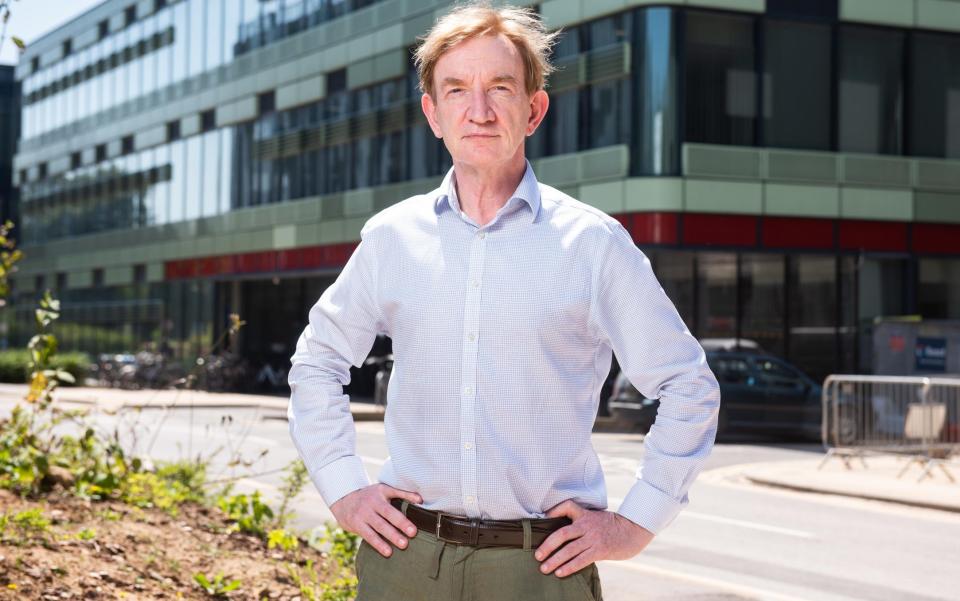Scientists in spat over whether to infect people in coronavirus vaccine trials


Scientists working on Britain's best hope for a coronavirus vaccine are understood to be at odds about whether to deliberately infect healthy patients in order to test it.
Professor Adrian Hill, the director of the Jenner Institute at Oxford University, wants to recruit young volunteers for such tests in the hope that it will speed up the race for a successful jab.
Prof Hill is among hundreds of scientists advocating the use of "human challenge trials", which would see healthy people under the age of 30 deliberately infected in order to test the vaccine.
But Sarah Gilbert, professor of vaccinology at the institute, is understood to have clashed with him over his intentions, believing the risk to volunteers is too high.
Their dilemma is whether to expose volunteers to the virus – which could mean a successful vaccine becomes available more quickly – or wait until any potential long-term effects are better understood.
Prof Hill is part of the research team working on a vaccine, and last month said he would like to see trials that test the jab on those who have been deliberately infected with the virus occurring by the end of this year.
"Everybody would agree that the risk is extremely low in young people," he said.

However, Prof Gilbert told BBC Radio 4: "It's not something that's going to happen in the short term," and The Mail on Sunday reported a source as saying the two scientists are "not particularly happy" with each other at the moment.
In a statement, the Jenner Institute said: "We are not planning to test the Oxford vaccine in challenge models at the present time."
Earlier this year, Prof Gilbert told the House of Lords science and technology committee that the success of lockdown in cutting transmission of coronavirus was making it far more difficult to develop a vaccine.
She told peers that the UK study had "little chance, frankly, of determining efficacy", with researchers seeking to work with multiple countries in order to test it in places where the virus was more common. The Oxford team is already running a trial in Brazil because the numbers of transmissions are much higher than in the UK.
Meanwhile, Downing Street has been advised that there is a 50 per cent chance that a vaccine could be administered by next year but it is unlikely to give complete protection against the virus.
Instead, the Oxford University team expect the jab to "mitigate" the worst effects by lessening the severity of the symptoms. Trials found that two thirds of recipients developed headaches and a fifth developed a high temperature, it is understood.
In July, Prof Hill announced that initial trials on 1,077 British adults showed the Oxford vaccine induced strong antibody and T-cell responses, potentially offering a "double defence" against coronavirus. Antibodies can repel the virus, while T-cells, a type of white blood cell, help to target infected cells.
During the trials, 90 per cent of recipients were shown to have developed neutralising antibodies after one dose of the vaccine, prompting ministers to order 190 million doses of Covid-19 vaccine, of which 100 million are the Oxford version.
Also in July, Prof Hill said he had been working with a US campaign group called "1 Day Sooner" to secure medical-grade doses of Sars-CoV2, the virus that causes Covid-19, which would be required for the human challenge trials.
The group is made up of more than 30,000 would-be volunteers in 140 countries who say they are prepared to take part in challenge studies.
A spokesman for Oxford University said: "We are not planning to test the Oxford vaccine in challenge models at the present time as we have extensive international clinical trials to evaluate the Oxford vaccine in a real world setting.
"Challenge studies could be very helpful in understanding the biology of the disease, and better understanding immunity after infection, if they can be conducted safely – and groundwork to think about how these studies could be conducted safely would be helpful for any future studies."

